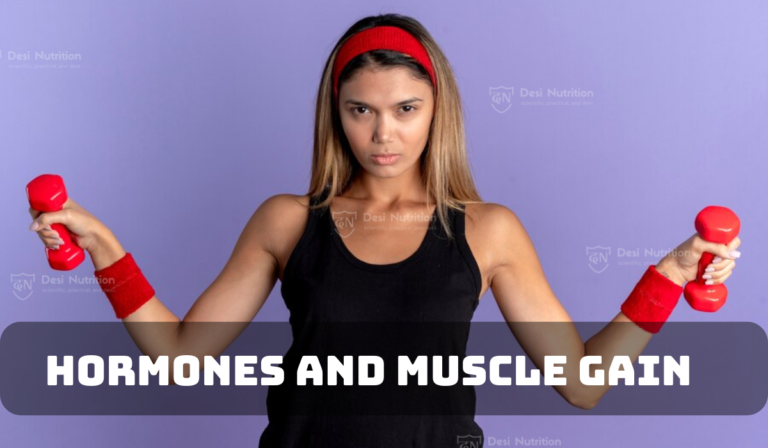Hormones have a vital role to play in muscle gain. Building muscle is attributed to lighting weight hitting the gym and consuming protein food sources but the hormones also contribute to muscle building. In this article, we will discuss how hormones and muscle gain are related.
The hormonal environment in your body influences your muscle gain journey because the hormones act as signals to your molecules that regulate physiological processes. Physiological processes like muscle protein synthetic, fat metabolism, energy levels and overall recovery which are involved in muscle building are regulated by hormones.

Role of Testosterone
Testosterone is the primary muscle-building hormone which influences your boyd’s ability to build and maintain muscle mass.
Role in Muscle Gain:
Testosterone is the primary hormone in muscle gain because it is an anabolic hormone that helps to build muscle tissue. The hormone influences muscle protein synthesis. It is the process that helps the body to repair and build muscle fibers after they have undergone micro tear and damage during strength training. High levels of testosterone increase muscle protein synthesis which promotes muscle gain.
How It Works:
The role of testosterone in muscle building is crucial as they work by bounding the androgen receptors in muscle cells. The binding of androgen initiates a series of cellular processes that promote muscle fiber growth. Testosterone also helps to increase the release of other growth factors that contribute to muscle repair and hypertrophy. This hormone also boosts the body’s ability to recover from intense exercise by reducing muscle damage and promoting quicker repair.
Factors That Affect Testosterone Levels:
- Age: the levels of testosterone gradually and naturally decline with age. That is why it gets harder for you to grow muscles when you get older.
- Exercise: some of the exercises like compound lifts, which includes squats and deadlifts are known to temporarily boost testosterone levels.
- Diet: a balanced diet with all the essential macronutrients, namely protein, carbohydrates and fats helps to maintain the optimal testosterone production.
- Sleep and Stress: Lack of sleep and chronic stress can negatively impact your testosterone levels.
Role of Growth Hormone (GH)
Growth hormone (GH) is attributed to repair and maintenance of the muscle. It is another anabolic hormone which supports muscle repair and regeneration. GH is produced in the pituitary gland which stimulates tissue growth. It also aids in protein synthesis and promotes the optimal utilization of fat as an energy source. This allows the body to spare muscle tissue during fat burning.
How It Works:
GH works by stimulating the production of insulin-like growth factor-1 (IGF-1) in the liver. This directly promotes muscle growth by increasing the uptake of amino acids into muscle cells. This action promotes two functions, repairing muscle fiber being the primary one and it also promotes hypertrophy of muscle tissues. GH is not a mere growth hormone but it also helps to increase collagen synthesis which strengthens tendons and ligaments which are essential structures that support muscle mass.
Factors That Affect Growth Hormone Levels:
- Exercise: Exercises help to increase the production of GH in your body. High-intensity interval training (HIIT) and resistance training are the particular exercises that help to spike GH levels.
- Sleep: GH promotes muscle recovery and growth when you are in deep sleep because that is the time when it is released in your body. That is a major reason why sleep is considered an essential aspect of the muscle recovery process.
- Diet: diet plays a crucial role in the production and maintenance of GH levels. Include protein sources in your diet and also focus on fasting for designated periods of time that can help stimulate the HGH production.
Role of Insulin
An anabolic hormone, insulin facilitates the storage of nutrients in cells which are crucial for muscle recovery and growth. We know that muscle grows in the recovery period and it needs nutrients that can help to recover the damaged muscles in the body after workout sessions. Insulin ensures the transport of glucose (carbohydrates) and amino acids (protein) into muscle cells.
How It Works:
Insulin is a hormone that manages your blood sugar levels. It is produced after you eat, especially carbohydrates. Insulin helps to absorb glucose and amino acids which are used as energy and also to repair muscles. In a state where you are well-fed and have consumed complex carbohydrates, the insulin helps inhibit muscle breakdown, also known as catabolism and muscle-building (anabolism) response.
Balancing Insulin for Muscle Gain:
- Carb Timing: If you want to maximize insulin’s anabolic effects you need to be well fed. Consume complex carbohydrates before workout sessions to help replenish the glycogen stores and transport nutrients into muscle cells.
- Glycemic Index: glycemic index of carbohydrates can help with the production of insulin and optimize its role in muscle gain without losing excessive fat storage. Consume low GI carbs which are slower to digest, throughout the day and high GI carbs post-workout.
Role of Cortisol
Cortisol is the stress hormone and it could severely impact your muscle gain process. Often seen as a catabolic hormone, cortisol is known to break down muscle tissues. So the question arises if it is a catabolic hormone why is it connected to muscle growth. Well, it is connected to muscle gain because it is often released in increased amounts during and post workout because of the stress; hence, affecting your muscle gain journey.
Cortisol is released by the adrenal glands during stressful situations both mental and physical. So during intense exercise your body does produce cortisol. Short-term increase in cortisol is normal and manageable but when the production is prolonged it can hinder muscle growth.
How It Works:
Cortisol, the stress hormone, stimulates the breakdown of muscle protein into amino acids which is then used by the liver to produce glucose to use as energy. This is beneficial during acute stress when you are working out but elevation of chronic stress due to overtraining, poor recovery or chronic psychological stress could lead to muscle loss, decreased performance and an increase in fat storage.
Managing Cortisol for Optimal Muscle Growth:
- Rest and Recovery: rest and recovery should be your priority to manage the cortisol levels in your body. Adequate rest will ensure proper recovery of your muscles and cortisol will not elevate in your body to keep you free from stress.
- Stress Management: Practice stress management techniques to keep cortisol levels in check. Techniques like meditation, deep breathing exercises and inadequate sleep can help to control stress and cortisol production.
- Nutrition: Nutrition is the key to control the production of cortisol. Though acute cortisol production is manageable, here we are talking about controlling an increase in the cortisol levels. Ensure to consume carbohydrates, especially post-workout to control excessive cortisol production.
Role of Insulin-Like Growth Factor-1 (IGF-1)
The hormone IGF-1 is the muscle repair specialist. It is known to be a powerful anabolic hormone that works in combination with growth hormone to stimulate muscle repair. It also helps in regeneration and growth of muscle fibers. IGF-1 is produced in the liver in response to GH stimulation. IGF-1 are also key players in proliferation and differentiation of satellite cells which are essential for muscle repair hypertrophy.
How It Works:
IGF-1 helps to enhance the absorption of amino acids and glucose into the muscle cells. It helps to promote protein synthesis and inhibit protein breakdown. IGF-1 also activates satellite cells which assists in muscle repair and growth after damage caused due to resistance training.
Enhancing IGF-1 Levels:
- Exercise: Exercises like resistance training especially eccentric focused exercises can help to boost IGF-1 production.
- Diet: a balanced diet with protein content can help to enhance IGF-1 levels in your body. Protein helps to enhance muscle growth because it produces amino acids like leucine which directly stimulate IGF-1 and muscle protein synthesis.
- Recovery: You need to make recovery your priority while muscle building because it helps you in many ways one of which is the production of IGF-1, essential for muscle growth. Opt for proper recovery strategies including proper sleep and stress management.
Role of Estrogen: The Overlooked Hormone in Muscle Growth
Are you not aware of the role of estrogen in muscle growth? Don’t worry a lot of people don’t because it’s role is often overlooked in muscle growth. Estrogen is a hormone prominently produced in a female body. But think of this hormone as testosterone. You know the way testosterone levels are high in men and low in women, estrogen is opposite. Its levels are high in women and low in men. In muscle growth and recovery, estrogen acts as a protective hormone that affects muscle tissues and helps to reduce muscle damage after exercise.
How It Works:
Estrogen works by promoting the activation of satellite cells and also increases muscle protein synthesis. Yes, it works similarly to how testosterone and IGF-1 works. Apart from that, estrogen helps to reduce inflammation and oxidative stress in muscle tissues which leads to faster recovery and less muscle soreness after workout.
Managing Estrogen for Muscle Growth:
- Exercise: Exercises can help to balance estrogen levels and enhance muscle-protective effects. Indulge in strength training regularly to boost estrogen levels.
- Nutrition: Nutrition is key in the production of any hormone be it estrogen or any other anabolic hormone. Ensure to maintain a balanced diet that helps to support hormonal health. Choose foods rich in phytoestrogens like soy, flaxseeds and legumes that can help to maintain estrogen levels.
- Avoiding Imbalances: Excessively high or low estrogen levels, due to issues like hormonal imbalances or overuse of anabolic steroids, can impair muscle growth and overall health.
Frequently Asked Questions
What hormone levels are required for muscle building?
Ans. High levels of testosterone are associated with muscle building.
Why do I gain muscles so fast as a female?
Ans. testosterone is the hormone that is related to muscle gain and because of the low levels of this hormone women take time to gain muscle. But if you are gaining muscle fast as a female it could be due to genetic reasons. The reason could also be associated with the levels of estrogen and testosterone in your body.
How to speed up muscle growth?
Ans. In order to speed up muscle growth you need to increase the intensity of the workout instead of working out for long hours.




